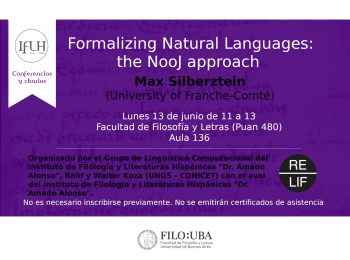A cargo del Dr. Max Silberztein (University of Franche-Comté), el encuentro será el lunes 13 de junio, de 11 a 13, en la Facultad de Filosofía y Letras (Puan 480), Aula 136.
La charla será en inglés y es organizada por Walter Koza (UNGS - CONICET), Relif y el grupo de Lingüística Computacional del Instituto de Filología y Literaturas Hispánicas "Dr. Amado Alonso".
No se entregarán certificados de asistencia.
Formalizing Natural Languages: the NooJ approach
Max Silberztein
NooJ is a linguistic platform used for three applications:
⟶ Develop linguistic resources to formalize various linguistic phenomena at the orthographical, lexical, morphological, syntactic and semantic levels, for any natural language (Linguistics).
⟶ Create and manage corpora of texts, apply linguistic resources (dictionaries and grammars) to them and then perform various statistical analyses in Corpus Linguistics and Digital Humanities.
⟶ Use NooJ's engine and linguistic resources to construct a dozen Natural Language Processing applications, including: Text Mining, Text Information extraction, Business Intelligence, Named Entity Recognition, Paraphrase generation, Machine Translation, RDF to Text Generation, Automatic Semantic Annotation, etc.
NooJ's linguistic engine offers the four types of formal grammars of the Chomsky hierarchy: Regular grammars, Context-Free Grammars, Context-Sensitive Grammars and Unrestricted Grammars. NooJ's parsers are optimized and most resources can be applied to large texts in real time.
All NooJ’s information is represented by annotations stored in the Text Annotation Structure (TAS) and are added to, or removed from the TAS in cascade. Annotations can represent agglutinated and intra-word linguistic units (e.g. "cannot" = <can,V> <not,ADV>), simple words (e.g. <table,N>), multiword units (e.g. <as a matter of fact,ADV>), discontinuous expressions and phrasal verbs (e.g. "turn ... off" = <turn off,PV>), as well as any syntactic (constituent, dependency or predicative) structure. TAS can be exported to XML files.
See www.nooj4nlp.org to download NooJ, its manual, linguistic resources and get references and tutorials.



